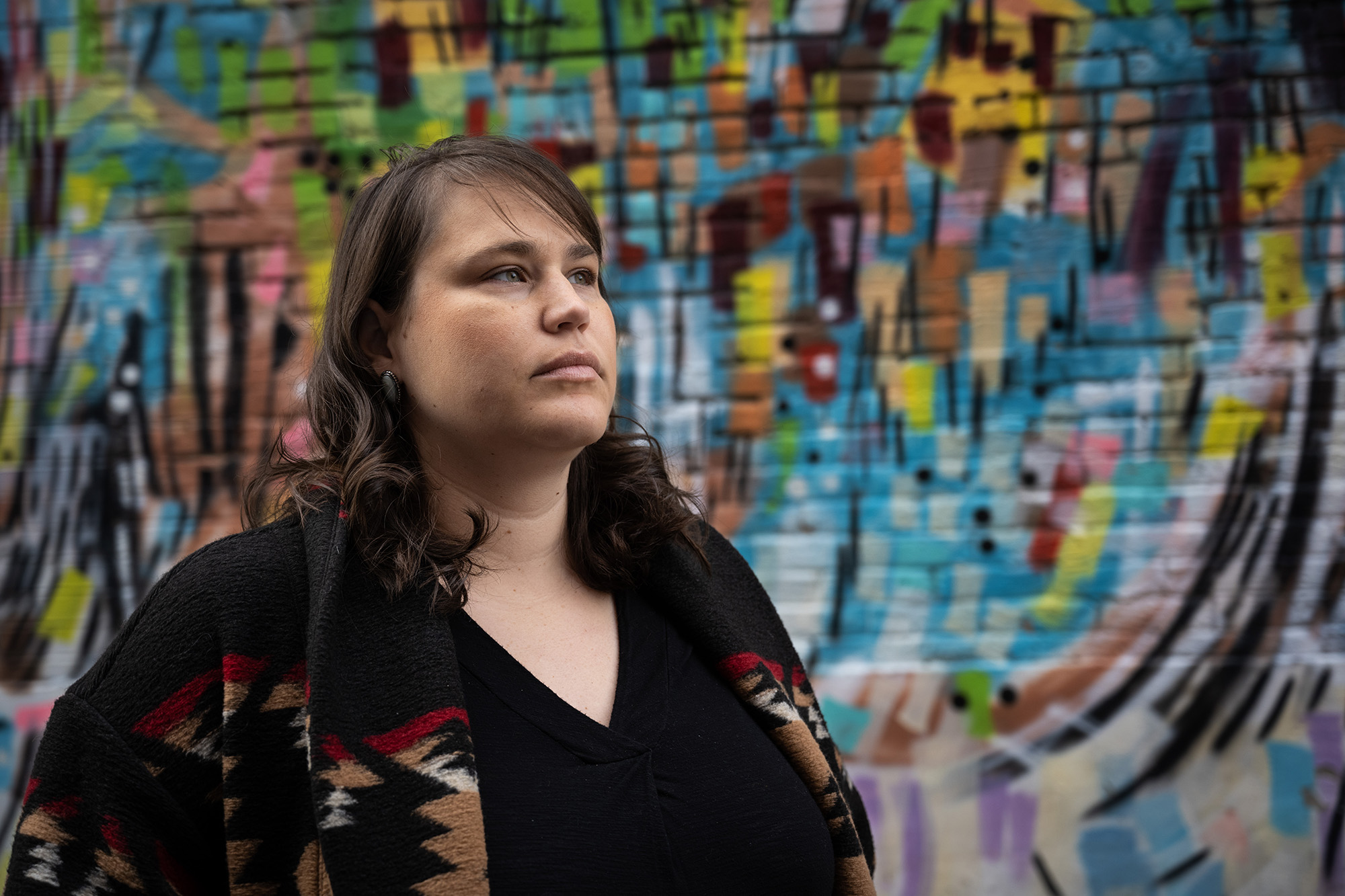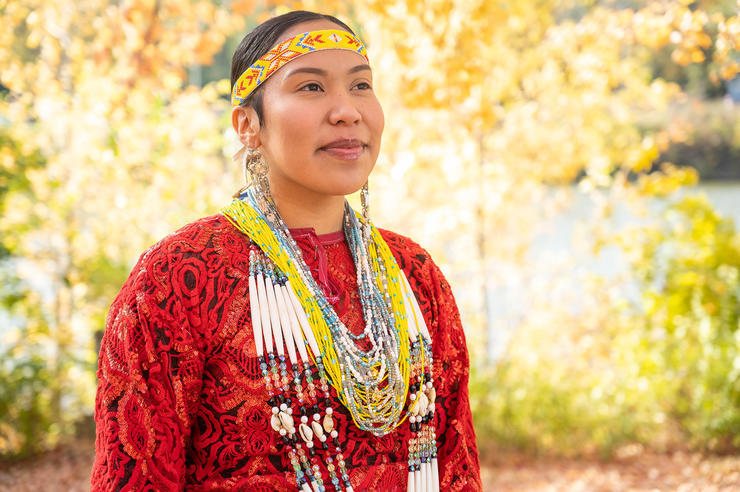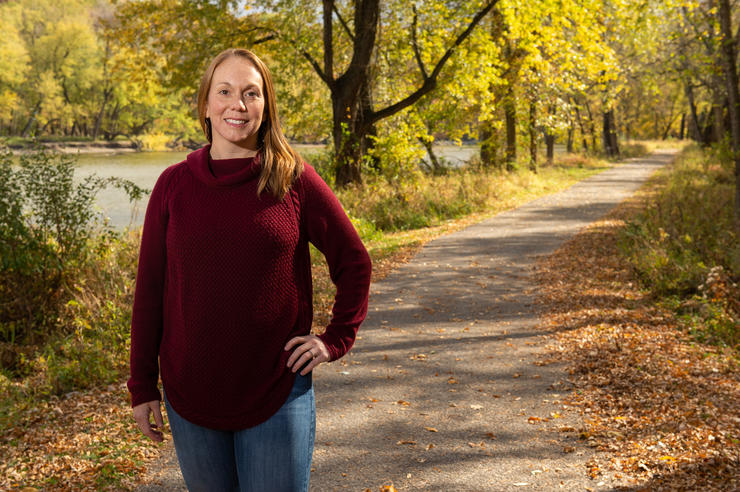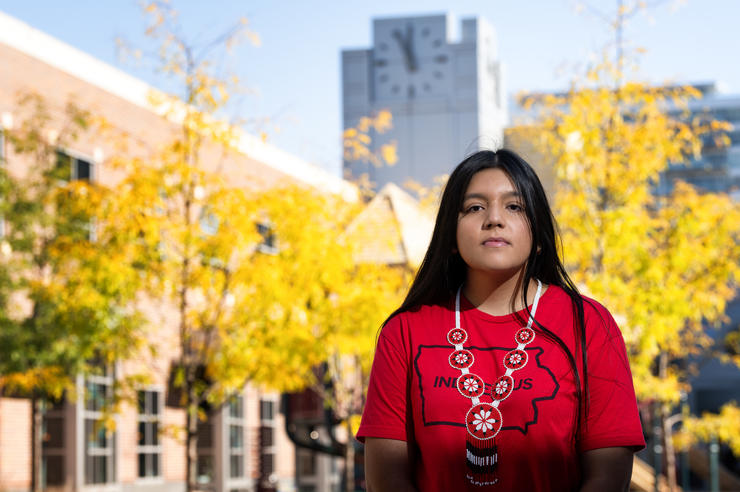Bringing a passion for policy to the classroom

When Carrie Schuettpelz walks into her classroom on the University of Iowa campus, she is on a mission: to prepare students to solve community problems. She draws not only on her policymaking experience but also on her Native American heritage.
“That identity is the lens through which I see things,” says Schuettpelz, a 2006 UI alumna and member of the Lumbee Tribe of North Carolina. “And it’s not just a Native perspective—it’s thinking about systemic inequity and the ways that people of color are historically, but also currently, not served well by policies or institutions. I think sometimes that perspective is lacking, especially in formal education, so I love giving my students readings from writers of color. I want us to have an open and honest dialogue about the issues.”
Schuettpelz, who has a joint faculty appointment in the Public Policy Center and the School of Planning and Public Affairs, teaches Public Policy and Persuasion, a class she created in which students study policy concepts, develop written and oral presentation skills, and then collaborate with a partner to address community challenges.
Carrie Schuettpelz, UI associate professor of practice and member of the Lumbee Tribe of North Carolina, suggests seeking out Native American voices to better understand their perspectives, and shares a few of her favorites.
- Books: A Mind Spread Out on the Ground by Alicia Elliott; There There by Tommy Orange; Louise Erdrich’s Pulitzer Prize-winning The Night Watchman; and Carry: A Memoir of Survival on Stolen Land by Toni Jensen
- TV shows: Reservation Dogs, a comedy on FX on Hulu featuring a cast, crew, and creative team that is almost entirely Native American
- Shopping: The House of DOTŁ’IZHI, Iowa City’s first Indigenous woman–owned business (recently featured in The Daily Iowan)
“Students spend the first half of the semester learning the nuts and bolts—how to write a memo, how to make a presentation, how to formulate policy recommendations—and then the second half of the semester, they work with the community. This fall we’re working with the city of Maquoketa,” she says. “It’s been a really great class. I’ve had students go on to pursue Americorps and Fulbright and master’s degrees in public policy. A lot of students don’t know about policy, but once they get involved in it, many of them get excited about it. It’s awesome to see my students make that turn.”
Schuettpelz, who grew up in Cedar Rapids and studied political science and anthropology at Iowa, says she was always interested in how people around the world lived. So, when one of her professors encouraged her to pursue extracurricular learning, she applied for and won a Stanley Undergraduate Award for International Research and traveled to Romania her sophomore year.
She continued on that path after graduation, studying political science in Copenhagen as a Fulbright Scholar, and planned to pursue international work. A major event in her hometown, however, drew her back to the United States.
“Having lived in Romania and Copenhagen, I was really interested in the European Union, and I worked for the European Commission for a while in Brussels. Although that was a good experience, I realized that I wanted to be closer to home. All of the issues I was thinking about abroad were issues that we had here,” she says. “In fact, halfway through my time in Brussels, the 2008 flood happened. My hometown was underwater, and I was thousands of miles away. There was nothing I could do. I realized at that moment that I wanted to solve problems closer to home.”
Schuettpelz enrolled in the Master in Public Policy program at Harvard University’s Kennedy School of Government and then took a job during the Obama administration as a policy adviser with the U.S. Department of Housing and Urban Development, where she worked on issues related to homelessness. It was a job she loved—and one from which she has taken valuable lessons.
“We couldn’t just sit in our D.C. offices and solve problems. We traveled all over the country and met the people who every single day were running the shelters and serving as caseworkers. We learned from them what was working and what wasn’t working and then used that information to make policies that were impactful,” she says. “The people doing the work were so incredible—so smart, so passionate, so driven. It was a really exciting time.”
“I’ve had students go on to pursue Americorps and Fulbright and master’s degrees in public policy. A lot of students don’t know about policy, but once they get involved in it, many of them get excited about it. It’s awesome to see my students make that turn.”
When the administration changed in 2016, Schuettpelz decided to pursue another passion—creative writing—and enrolled in the Master of Fine Arts program at the University of Wisconsin–Madison. Ultimately, her experience teaching as a graduate student showed her that she could make the biggest impact in the classroom.
“College students have a lot of pressure to know exactly who they are and what they want to do, and it’s really fulfilling to help them realize that maybe what it is they want to do is something they’ve never even thought about. That happens to a lot of my students, because of the practical work they get to do,” says Schuettpelz, who still writes and is exploring Native American membership and self-identification in a forthcoming book called The Indian Card. “I’ve had so many students who have completely changed course, and I love that. Seeing their curiosity and enthusiasm flourish is really exciting to me.”
The UI School of Planning and Public Affairs has partnered with the UI Department of Political Science to offer a Master of Public Affairs. The program trains students to address community challenges in a number of areas, including environmental change, health care, housing, racism, transportation, economic development, public safety, and more.
In spring 2022, Schuettpelz will teach Poverty Policy in which the students will discuss racial inequities and how government policy often fails to support people of color. Tom Rice, UI professor of political science, says he is proud to have a former student following in his footsteps teaching policy—while also making her own path.
“Carrie was an excellent student in my undergraduate policy research course many years ago, so it is especially gratifying that she is now teaching her own policy course right here at Iowa,” he says. “She has her students hone their skills by doing research projects for local communities and organizations, and that is win-win: Our students enjoy seeing their work applied in the real world, and the communities and organizations benefit from the work of our students.”
Looking toward the future, Schuettpelz is developing several new classes, including one on Native American policy. She also is lobbying to recruit more Native American students and faculty to campus.
“I would love to see the university invest in Native faculty in areas that are really important to the Native community. Let’s bring in a Native social work professor, for example, or someone who focuses on public health,” says Schuettpelz, who has taught Native American high school students participating the university’s Iowa First Nation Summer Program. “Recruiting students from Native communities or students of color or students from marginalized communities requires having people on campus who look like them or who can relate to their experiences. Our Native community here is mighty but small, and I would love to see the university make that a priority.”



